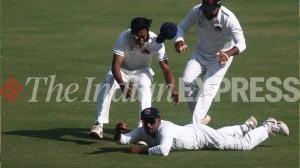No Stings Attached
In 1987,Sting stepped onstage for the first time to sing The Ballad of Mack the Knife with the Hamburg State Orchestra,and he noticed a group of people,all with blue and grey hair....
In 1987,Sting stepped onstage for the first time to sing The Ballad of Mack the Knife with the Hamburg State Orchestra,and he noticed a group of people,all with blue and grey hair,and jewels and fur, who were jeering him before hed opened his mouth.
This gang,he learned,was a claque that expected to be paid for its applause. If any claques remain at the Metropolitan Opera ,Sting said with a chuckle: Im paying them,believe me. Out of my own pocket.
Its a joke,of course: the only dissonant tones likely to be heard at the Met when Sting plays his first-ever performances with the Royal Philharmonic Concert Orchestra of Britain will be coming from audience members trying to sing along on Roxanne.
It is also a reminder from this former Police singer and bassist turned successful pop singer that he is still capable of being humbled. That quality may not be immediately visible in his sumptuous Central Park West duplex, where he was taking a break from his tour and preparing for the release of a new album,Symphonicities,containing orchestral arrangements of his songs.
The apartments host can sometimes seem like the ultimate version of that co-worker or college-reunion acquaintance who is always one-upping your anecdotes: ask Sting about the 19th-century aluminium double bass he keeps near his bookshelves and he will say he uses it to play one little piece of Purcell every day and thats it; mention the two chess sets he keeps on his coffee table and hell tell you about the matches he played against the grandmaster Garry Kasparov . Of course he beat me every time. But you know,he cant sing.
Sting,58,said the appreciation for classical music he cultivated from the piano playing of his hairdresser mother and BBC radio of the 1950s was not something he could readily confess to back in his Police days.
More recently his musical wanderings have led him to such disparate destinations as Songs From the Labyrinth his 2006 album of Elizabethan lute music,and Twin Spirits, a theatre project in which Sting and Trudie Styler,his wife,read the correspondence and joint diary of Robert and Clara Schumann.
What unites these endeavours,Stings friends and colleagues say is his authentic interest in them.
There are people that you think,Oh my God,what are they doing now? But Sting is gifted enough to take people on a journey with him and have him feel satisfied that they went along. I dont think hes toying with this stuff said Allan Buchman,the artistic director of Culture Project.
Even a seemingly straightforward album of orchestral music presents challenges,said Rob Mathes,a composer and arranger who produced Symphonicities with Sting. Such a record could end up being nothing but ballads,where its all lush and warm,beautifully voiced chords from the first song to the 10th song added Mathes.
Sting said his goal was simply to see an orchestra play arrangements that would have steam come out of their ears.
This being Sting,conversation with him naturally turned to subjects like the BP oil spill,the possibility of sustainable fuel sources and Eastern mysticism – in this case via the decorative Tibetan dZi stone he wears around his neck. They say they are planted by Bodhisattvas, he said. its a beautiful thing.
Should Sting ever want to deflate his ego,all he has to do is step outside his apartment.
I have a feeling that all New Yorkers,no matter what theyre doing,are in their own TV series with their own theme music,and you are merely a guest on their show, he said.
He added: Were all celebrities in this town. I find it very comfortable.


- 01
- 02
- 03
- 04
- 05





























